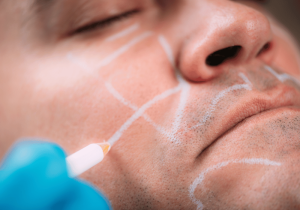Are you considering using dermal fillers to enhance your facial appearance or plump areas on your body? If so, you may be surprised by the wide range of uses that these treatments offer. Dermal filler injections are an increasingly popular treatment option to reduce wrinkles, smooth out scars, and even add volume in certain areas of the face and body. In this post, we’ll explore what dermal fillers can be used for and why it may be a great choice for some individuals looking for non-surgical aesthetic solutions. Read on to learn more!
What are dermal fillers and what can they do for you
 Dermal fillers are a cosmetic treatment used to enhance your face, restoring your youthful look by reversing and softening the appearance of facial wrinkles. The key ingredient in most dermal fillers is hyaluronic acid, which helps keep skin hydrated and add volume to areas that might be lacking. Fillers can be used to plump up lips, smooth away fine lines on the forehead and cheekbones, as well as to even out tears troughs and nasolabial folds. Following the injections, you’ll see an immediate improvement in the contours of your face. Dermal fillers are a great way to achieve natural-looking results when it comes to facial rejuvenation with minimal downtime.
Dermal fillers are a cosmetic treatment used to enhance your face, restoring your youthful look by reversing and softening the appearance of facial wrinkles. The key ingredient in most dermal fillers is hyaluronic acid, which helps keep skin hydrated and add volume to areas that might be lacking. Fillers can be used to plump up lips, smooth away fine lines on the forehead and cheekbones, as well as to even out tears troughs and nasolabial folds. Following the injections, you’ll see an immediate improvement in the contours of your face. Dermal fillers are a great way to achieve natural-looking results when it comes to facial rejuvenation with minimal downtime.
How do dermal fillers work
Dermal fillers are a popular method of smoothing wrinkles and plumping up skin which has begun to sags due to aging. The fillers supplement the body’s own supply of hyaluronic acid, a naturally occurring hydrating substance, so as to add volume and structure to skin which has lost elasticity over time. Common areas which may benefit from this treatment include around the eyes, lips, cheeks, and chin. When injected into the skin, these fillers help reduce lines and wrinkles for a more youthful-looking appearance that can last for months or even years depending on the filler used.
Preparing for your procedure
 Being prepared is key to getting the best results from any procedure or surgery. It’s important to arm yourself with knowledge prior to your appointment. Discuss potential risks, understand how the procedure works, obtain written information for reference, and learn what to expect before, during, and after. Additionally, if you take any medications – prescription or non-prescription, or have medical conditions such as diabetes, high blood pressure, or kidney problems that could affect the outcome of the procedure; make sure your doctor is aware beforehand. Stress should also be kept within reason; now is not the time to start up a new habit like running a marathon! Rest and relaxation are advisable on the day of your appointment so you can go into it feeling calm and collected. Following these tips can help ensure a smoother experience overall and improve the quality of your results.
Being prepared is key to getting the best results from any procedure or surgery. It’s important to arm yourself with knowledge prior to your appointment. Discuss potential risks, understand how the procedure works, obtain written information for reference, and learn what to expect before, during, and after. Additionally, if you take any medications – prescription or non-prescription, or have medical conditions such as diabetes, high blood pressure, or kidney problems that could affect the outcome of the procedure; make sure your doctor is aware beforehand. Stress should also be kept within reason; now is not the time to start up a new habit like running a marathon! Rest and relaxation are advisable on the day of your appointment so you can go into it feeling calm and collected. Following these tips can help ensure a smoother experience overall and improve the quality of your results.


